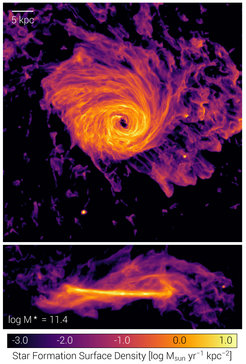Golden Spike Award for Dylan Nelson

The IllustrisTNG simulation contains galaxies similar in size and shape to real galaxies. This image shows the Star Formation Rate for one of these galaxies in face-on (top) and edge-on (bottom) views. The TNG model captures one of the most important stages in the evolution of a galaxy, when it terminates its ongoing star formation. This shifts the light emitted by a galaxies’ stars to longer, redder wavelengths, in good agreement with observations.
When a large simulation is performing a particularly difficult calculation on a high-performance computer cluster, you are likely to see a spike – a maximum in the usage of computing resources. In 1998, the High-Performance Computing Center Stuttgart established the “Golden Spike Award” to honour particularly ambitious and successful projects running on the Center’s computers.
This year, one of the three Golden Spikes goes to the two co-leaders (co-PIs) of the TNG50 project: Dylan Nelson and Annalisa Pillepich. Their TNG50 simulation, which traces the evolution of galaxies from the beginning shortly after the hot Big Bang phase, 13.8 billion years ago, to the present, required 16320 independent processors (computing cores) to run around the clock for more than a year, for a total of more than 130 million processor hours. TNG50 is part of The Next Generation Illustris (IllustrisTNG) set of cosmological simulations, and is the first simulation to combine such a large volume of space (allowing for statistical inferences) with such a level of detail.
